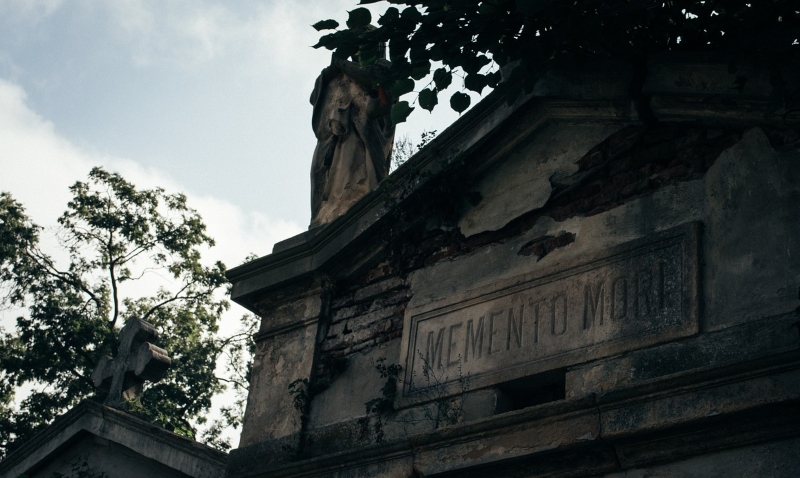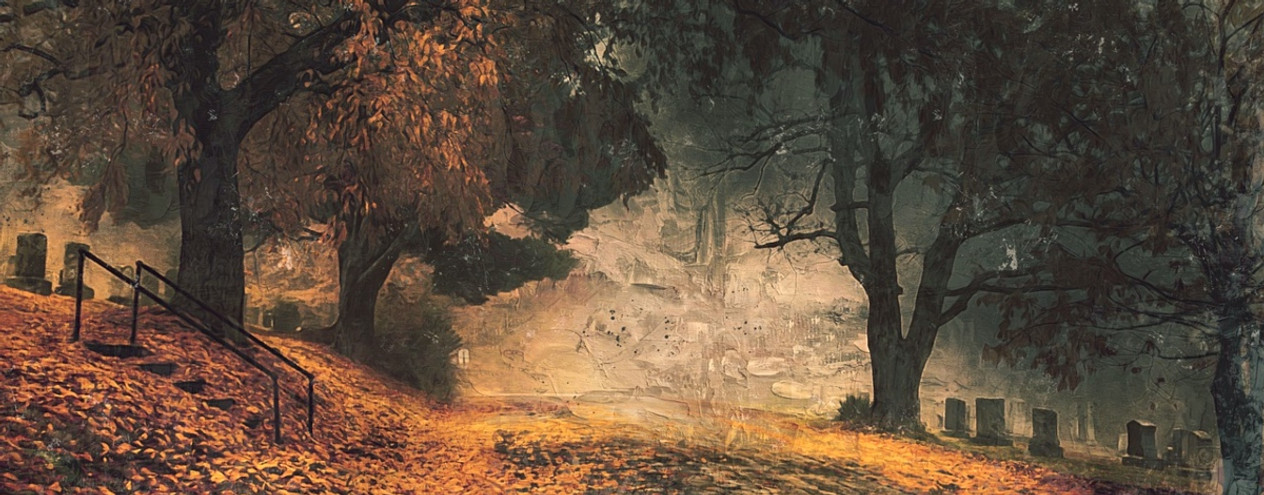Purgatory: Why We Believe & What We Can Do
Nov 01, 2023 by Cheryl Hadley
After growth and vibrancy during the lush and prolific seasons, sunstruck leaves in the treetops begin to age and turn. They slowly dapple with the passage of time. Drying and curling until no longer dense and vigorous, they are still beautiful—merely changed.
Gradually they detach and drift in silence from their branches, blanketing the ground in a marvelous show of gold, russet, and ruby red. The air becomes more soothing and cool, the skies somehow heavier. The earth's cycle of production slows to a season of rest.
The whole of nature enters a new phase, but the brilliance of the foliage is its last hurrah.
Isn't fall the perfect metaphor—and the perfect season—to symbolize the journey from life to death? It especially evokes the waiting, change, and purification of purgatory, before the Sower who once bestowed flourishing life in the forest gathers the jeweled souls to Himself in their final season.

What Scripture Teaches About Death & Purification
Sacred Scripture teaches us explicitly about who enters the Kingdom of Heaven and about our own impurities.
But nothing unclean shall enter heaven (Revelations 21:27).
We know that we all sin.
...for there is no man who does not sin. - 1 Kings 8:46
If we say we have no sin, we deceive ourselves, and the truth is not in us. - 1 John 1:8
...since all have sinned, and fallen short of the glory of God. - Romans 3:23
Sin is our collective inheritance. But so is heaven. The Bible tells us that He has borne our iniquities, carried our sorrows, been wounded for our transgressions, and His chastisement has made us whole, so that by His wounds we are healed (Isaiah 53:4-5).
So how can we reconcile these two teachings of our Faith? God, in His perfect wisdom and immeasurable mercy, does it for us, of course.
[[49154,1193]]
Like the leaves, most of us will undergo a process of change and waiting in our own season of dying, rather than immediately entering into perfect union with the Lover of Our Souls. Many of us will undergo our own unique season, thanks to the mercy of God. (We note here that it is very possible to avoid purgatory entirely by atoning for our sins on earth and we should strive to do so).
Faith & Reason
Since the Author of Scripture is also the Creator of man's intelligence, our Faith represents the perfection of common sense. It is supreme reason.
We have all known someone who passed away unexpectedly. A person we knew, perhaps well, and considered of good character. Yet we know they surely had faults and imperfections at the instant of death.
Who among us would be so bold as to assert that the deceased was consigned to hell? Or that they surely went straight to heaven?
[[9351,18404]]
Not only do we experience grief and loss when our loved ones leave us in death, but we may also worry for the state of their souls as a natural response and reflection of our love. Scriptures and the Church have always taught of the existence of purgatory, where we are cleansed after death of the remnants of our sins, and where our souls are prepared to enter heaven and perfect union with God.
Most of us will experience this final spiritual season that will bring about our purification and perfection, so that we may dwell with Him in eternal glory.
In 1 Cor 3:15, St. Paul shares mercy and reason with us when he says:
He shall be saved, yet so as by fire.
Those who repent of their serious sins, even in their final moments shared with God alone, shall be saved. Yet their souls must be purified in the fires of purgatory from any sins not atoned for on earth.
[[14349, 35881]]
The Bible on Purgatory
As Catholics, we learn of the existence of the purifying fire known as purgatory from Sacred Scripture, Tradition, and reason.
2 Maccabees 12:46 reveals how Judas Maccabeus, hero of the war of Jewish independence, went with his army to recover the bodies of the fallen. He collected money to provide a sin offering to the temple, and exhorted survivors to turn to prayer for their fellow men, that their sins might be forgiven.
On the next day, as by that time it had become necessary, Judas and his men went to take up the bodies of the fallen and to bring them back to lie with their kinsmen in the sepulchres of their fathers. Then under the tunic of every one of the dead they found sacred tokens of the idols of Jam′nia, which the law forbids the Jews to wear. And it became clear to all that this was why these men had fallen. So they all blessed the ways of the Lord, the righteous Judge, who reveals the things that are hidden; and they turned to prayer, beseeching that the sin which had been committed might be wholly blotted out. And the noble Judas exhorted the people to keep themselves free from sin, for they had seen with their own eyes what had happened because of the sin of those who had fallen. He also took up a collection, man by man, to the amount of two thousand drachmas of silver, and sent it to Jerusalem to provide for a sin offering. In doing this he acted very well and honorably, taking account of the resurrection. For if he were not expecting that those who had fallen would rise again, it would have been superfluous and foolish to pray for the dead. But if he was looking to the splendid reward that is laid up for those who fall asleep in godliness, it was a holy and pious thought. Therefore he made atonement for the dead, that they might be delivered from their sin. It is therefore a holy and wholesome thought to pray for the dead, that they may be loosed from sins.
- 2 Maccabees 12:39-46
In other Bible verses we read of the legacy of prayer and charity for the dead.
Give your gift to all the living, and do not withhold grace from the dead. - Sirach 7:33
[[12707,47570]]
Scripture repeatedly speaks of a place of cleansing after death, known by different terms and descriptions. A furnace of purification, a cleansing fire, a fiery pit, a place beneath the earth, a refining pot.
We are told that everything, to that last farthing, shall be paid. We are told that, on the day of judgment, we will render an account of every idle word we speak.
Purgatory is God's merciful and loving response to His wayward children who die in a state of imperfection, as many of us will.
It is, in a sense, His last hurrah, as He snatches us from the grip of the evil one, despite our fallen natures. Purgatory is real, and we see evidence of it throughout our Faith from the very beginning, not only in Sacred Scripture, but from the early Fathers and our Sacred Tradition.
[[12874,49654]]
The Fathers of the Church
Our Church Fathers exhort us not to forget in prayer those who have gone before us into eternity, implying how important it was for the purification of their souls.
St. John Chrysostom wrote:
It was not without good reason ordained by the Apostles that mention should be made of the dead in the tremendous mysteries (the New Testament Sacrifice, the Holy Sacrifice of the Mass, in which the living Body and Blood of the Redeemer are daily offered for the living and the dead), because they knew well that they would receive benefit from it.
St. Augustine relayed as much in his Confessions, and told the story of his holy mother, St. Monica, who instructed him:
Lay this body anywhere; let not the care of it in any way disturb you. This only I request of you, that you would remember me at the altar of the Lord, wherever you be.
St. John Vianney pressed his flock:
Oh, my friends, let us pray much, and let us obtain many prayers from others, for the poor dead; the good God will render us back the good we do to them a hundredfold. Ah! if every one knew how useful this devotion to the holy souls in purgatory is to those who practice it, they would not be forgotten so often; the good God regards all that we do for them as if it were done to Himself.
[[2158,48947]]
Ancient Church Fathers like Tertullian, Eusebius, St. Cyril of Jerusalem, St. Ephrem, St. Ambrose, and St. Jerome instruct us to pray for the dead. Saints like Catherine of Genoa, Teresa of Avila, Faustina, Padre Pio, and many more echo this important teaching of our Faith.
The saints believed without question in the existence of purgatory and the importance of our contributions for those seeking deliverance.
The Fullness of Truth & Faith
While belief in purgatory was excised from the essentials of Protestant teaching, we need only go back to divinely inspired Scripture, which was our shared inheritance for over 1500 years, the earliest Christians, Sacred Tradition, and the saints to see that purgatory is a spiritual reality.
To know our Catholic Faith is to believe this truth. But this single truth is neither the fullness of God's message to His children, nor the fullness of His love. That revelation is not complete without the Person of Christ.
[[9629,48615]]
Remember that He came so that we might have life! He came to seek what was lost and to save mankind. He loves us with an everlasting love. Because of this, we need not be paralyzed by our fears of purgatory, only mindful to do all we can for our sanctification while here on earth.
The Holy Spirit gave us Scripture and Sacred Tradition to guide us in this lifetime and prepare us for the next. These tell us of Christ's life, character, teachings, and divinity, and of the establishment of the Church and the Sacraments. They extol the gifts of God and the essential elements of our Faith. They reveal that He created us to share in His glory.
Christ allows us to walk in His light and leave behind darkness. His yoke is easy and His burden light. He has given Himself for us in the most sublime and most supreme sacrifice of His Passion, then taught us to re-present that at the altar so as to share repeatedly in those graces. By all of this, He has shown us that there is nothing He would not do for us. Even for just one of us.
[[49821, 48652]]
When we consider the fullness of His doctrine, not just a portion of it, we see that purgatory is merciful love, an incredible gift, and an inestimable treasure for the children of God. As He told us, He desires mercy over sacrifice.
Why Does It Matter?
Had the Christian world continued in unity, all Christians would know and embrace this sacred reality. Imagine the souls who could be delivered, then, if all of our faithful brothers and sisters in Christ were united in prayer for the dead. We would empty Purgatory together in a victorious wave of souls heading home to their Heavenly Father!
Lack of understanding or rejection of the belief in purgatory among our brothers and sisters in Christ is a great loss, behooving each of us who does understand and believe to play a part in the deliverance of the holy souls awaiting our help.
[[48104,3375]]
We can offer the Holy Sacrifice of the Mass for them and offer our constant prayers and penances. During the month of November, we honor All Souls and All Saints. It's a particularly fruitful and appropriate time to offer all we can as remedies for these precious souls. Depending on our prayers, they await union with the Holy Trinity, Our Lady, the angels, and the saints.
The separation must be so painful and their longing so great.
[[638,4993]]
What Can We Do?
As we understand the very real possibility of one day experiencing purgatory ourselves, let us be greatly attentive to the needs of the holy souls in purgatory and cultivate a devotion to them. Pray and sacrifice for them and ask their help in your needs, since they can pray for us, but not for their own souls.
Together, we can offer everything from the Rosary, our Communions, Holy Mass intentions, Stations of the Cross, Chaplet of Divine Mercy, devout Confessions, and other prayers such as the Prayer of St. Gertrude.
We can give alms to the poor and make daily penances, offering them for the consolation and deliverance of souls being purified, who yearn for eternity with God.
[[8550,50691]]
The holy souls are obliged to rely completely upon our charity. But sadly, because there are many in this modern day who do not understand purgatory or reject its reality, souls languish, awaiting only our prayers, which cost us so little.
What a simple and uncomplicated gift we can contribute to the Kingdom of Heaven! What a gracious Father, Who allows His children to participate in the salvation of their brothers and sisters in Christ in such an intimate and important way!
[[23296,51021]]
We are the Church Militant, after all. From here below, we are still able to fight the good fight for ourselves, our loved ones, and those who can no longer affect the state of their own souls. The gift of purgatory and our own role in freeing souls there is an incredible reflection of His infinite love.
We can be the liberators of these holy souls. They await our mercy, even as they are immersed in His.
Let us prove the genuineness of our love, especially for the forgotten dead, whose loved ones do not know or understand the teachings of the Church.
They wait.
How will we respond?






